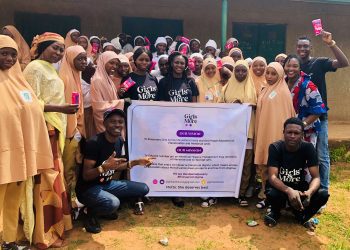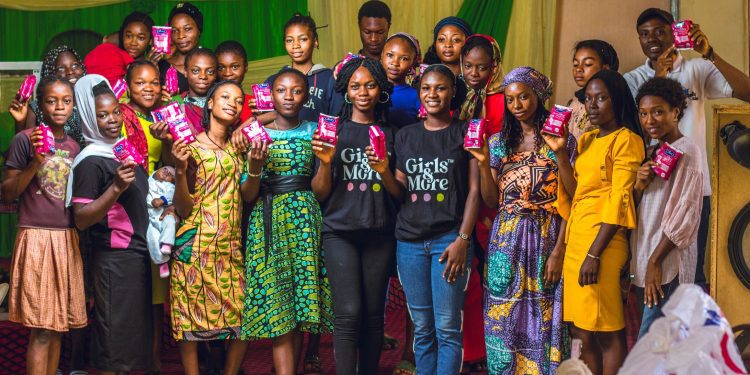Before Victoria Aliu reached puberty, she didn’t know about menstruation. Aliu, now 23, experienced her first menstruation while in class. Noticing a blood flow, coming out of her private part, she was apprehensive and quickly left the school to avoid the embarrassment that a stained dress could be bringing about among her friends and classmates.
Menstruation, as widely known, is the monthly discharge of blood and mucosal tissue from the inner lining of the uterus through the vagina of women. It is commonly called ‘period’.
In spite of being a natural phenomenon, it first appears to girls with fear, shame, and embarrassment due to the lack of awareness about changes that will happen to their bodies.
Aliu attended a mixed-gender school, where knowledge about menstruation and menstrual management is rarely taught. She only saw her gender peers that had already started menstruating being mocked by boys.
“When I started my own [period], It was not funny. I was not given that education. So when I saw my own, I was panicking; like blood, where is blood coming from? I was shocked and sickened already, but when I got home, my aunt was like sit down, let me talk to you about it” she said.
As she grew older, she encountered many young girls with more challenging stories of lack of menstrual knowledge, sociocultural restrictions, and barriers to menstrual hygiene management; limiting their daily and routine activities, including attendance in school.
The story of Aliu portrays how girls have limited or no knowledge about menstruation before their first menstrual and so they poorly experienced their first menses.
By studies, 37 million girls from low-income homes experience period poverty; that is, lack access to menstrual hygiene products like sanitary pads due to financial constraints. They engage in using non-absorbent materials to absorb the blood and during that time they stay uncomfortable and out of public activities including attending school.
Similar to how Aliu’s experience, Idowu Yunus, a 16-year-old senior secondary school student in Kaduna started her period when she was 13. Yunus was in Junior Secondary School (JSS) III in the midst of writing the Junior Secondary Certificate Examination otherwise known as ‘junior WAEC’ when she woke up one night and noticed blood coming out from her vagina. She informed her mum and that was the first time she got educated about menstruation.
Her mum told her to use tissue paper
“I started by using tissue paper (to absorb the blood) that day. I told my mum and she said ‘ok ooo, go and buy toilet roll’. I didn’t start with pads, it was after some years when I got to SS3, that was when I started using pads.” Yunus said.
While menstrual girls are stigmatised by the public and isolated from public activities, they are told not to touch boys as that will get them pregnant. Among others are restrictions, myths, and taboos that install misunderstanding and fear in the minds of girls.
Curbing the ugly trend, reinforcing the dignity of girls
Not only Aliu noticed that girls are educated about menstruation by their parents or relatives in a shallow way after their first experience, but also the trend of the lack of awareness, socio-cultural restrictions, and barriers to menstrual hygiene gave concern to her and thereby, she put up an initiative, Girls&More, which educates girls about changes in their bodies and how to stay healthy and maintain their self-esteem during menstruation.
While menstrual management is not discussed among adolescent girls, they consider themselves unclean and impure. The initiative, led by Victoria Aliu, an indigene of Kabba, Kogi State, and a 300L student of the Federal University of Technology, Minna, visits schools and local communities to sensitise girls on puberty, menstruation, and menstrual hygiene.
It also supports them with sanitary pads and pieces of period kits like pants to empower them to feel more confident and comfortable with their bodies during periods.
With its advocacy outreach taken to Idowu Yunus’s school in Kaduna, she knows more about menstruation and health hygiene than how her mum educated her when she first experienced her period.
“I learnt a lot when Girls&More visited my school to educate us about menstruation and hygiene. They taught us how to maintain ourselves as ladies, stay comfortable, and manage personal hygiene during menstruation. We were also given some pieces of sanitary kits, like pads and pants.
“I know more about it now than I was educated by my mother before,” she pointed out.
Similarly, Joyful Yemi, shared how much she knew about menstruation through the initiative’s advocacy to her school.

How it works
To outreach any school, the initiative writes a request to the school it intends to take its advocacy to, stating the need to make girls understand the biological facts of menstruation and the hygiene practices it requires.
On approval, the school will reach the initiative to communicate the agreed time their girls will be available, after which the team, Girls&More will visit the school to educate its girls on biological changes at puberty, the basis of menstruation, menstrual cycle, and seizure, sex education, infection risks posed by poor practices, practical use of period kits, and material disposal options. After the training, it supports indigent girls with pads.
“We go with our letter asking permission to talk to the girls and requesting a date when they will be available, we tell them why it’s important to do it. When they approve it, they will call us and ask us to come to do it and they will arrange their girls for us.
“For every outreach, we started by telling them about puberty, changes in their bodies, and talk about menstruation including premenstrual symptoms(PMS), and cramps. We make it visible so that when it comes, they have no fear of it.
Afterward, we give them sanitary pads and show them how to use the pad and the time limit they can use the pad as well as a way to dispose of their pads. We also show them period kits apart from pads. This includes sanitiser, medication for cramps, pant liners, and a set of pants,” said the initiator.
Having noticed that there are scores of out-of-school girls, in a quest to ensure no girl is left, the initiative, following the same approaches from community leaders, extends its outreach to local communities where girls suffer period puberty and awareness.
“We noticed lack of awareness has kept a lot of local girls in danger, so we also go to rural communities to sensitise their girls on ways they can manage their periods. These are the products they need, which is essential for them when they are on period.
“I even started with 20 girls from a community in Kaduna before I started campaigning on my social media handles,” she said.
Aliu, who lamented that menstrual education was not given the attention it requires, said teachers and parents fail to preach this to girls while the government also fails to encourage its learning into education in the syllabus.
“There was an incident of a girl in a school, she saw her period and got shocked and fainted. She was rushed to the clinic before the nurse told her it was a normal thing, because she doesn’t know what it was.
“The last school I visited in Kaduna, I asked them,” What is a vagina? They said they don’t know what the virginal is and they said sanitary pad is a biscuit,” she decried, calling for the inclusion of proper menstrual education into the curriculum.
She, however, said that the cost of sanitary pads had been a challenge in expanding the response to reach more girls. The cost of a small-size pad with 8 pieces is N600-N800, while a big-size pad with 30 pieces costs N1100-1400.
“Finance is what is restricting us from reaching more girls. Sanitary pads are way too expensive, one sanitary pad costs N600 for something you use in a month, there’s one of N1200 and there’s one of N1500.
“How I do it is, I ask my family and friends for funding support on what I want to do, I seek around for funds on my status; my personal savings too, and my team members have always been supporting this with funds,” she explained.
This story has been made possible by Nigeria Health Watch with support from the Solutions Journalism Network, a nonprofit organization dedicated to rigorous and compelling reporting about responses to social problems.

